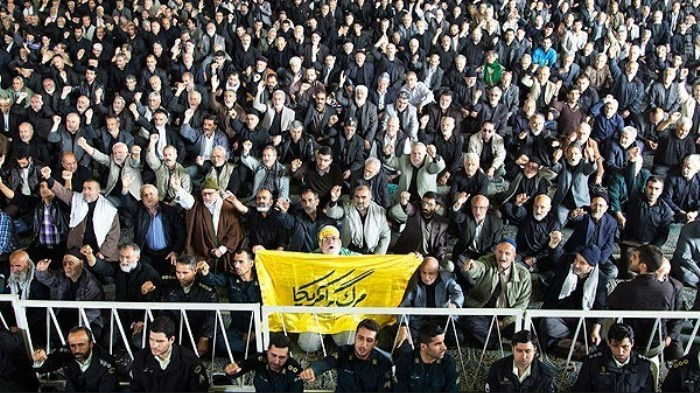Iran’s Friday Prayers: From Syrians to Saudis

(A Friday prayers' attendee holding a 'Death to the United States' banner; Photo: Vahid Naderi/Fars)
In Iran's Friday prayers on October 30, 2015, the JCPOA was expectedly a subject of discussion. In Tehran, Ayatollah Movahhedi Kermani cast doubt on the sincerity of Western partners in their nuclear agreement with Iran. "Removing sanctions is the main goal of the negotiations," he said. "But in the JCPOA it is subject to Iran's actions. There is no guarantee that they remove the sanctions afterwards."
The Friday prayers' leader in Ardebil, in northwestern province of Ardebil in the Azerbaijan region, called democracy, without its popular adjective in Iran's political discourse, 'religious', the "ultimate solution" to the crises of the region. Ayatollah Seyyed Hassan Ameli meanwhile slammed Western countries and their "hypocritical" call for democracy, claiming that they have turned democracy into a tool for their illegitimate interests.
Ardebil's Friday prayers' leader also pointed to the invitation for Iran to join the Vienna talks on the Syrian crisis, which, according to him, shows "the increasing political weight of Iran and Iran's exceptional influence on regional equations."
In Ahwaz, Ayatollah Jazayeri also pointed to the talks in Vienna, expressing hope that the fate of Syria be determined by its own people.
In Mashad, the conservative, vocal sermonizer of Friday prayers of this holy Shi'a city, Ayatollah Alamolhoda, issued fresh warnings about 'infiltration', a keyword repeated in every Friday prayers after Ayatollah Khamenei's speech on September 16, 2015. Alamolhoda warned the congregation that the US is trying to strip off the Islamic Republic from its anti-Imperialism garb and prove to the world that Iran has finally resigned to negotiation and 'shaking hands' after 37 years of resistance.
In Qom, locus of Iranian Shi'a seminaries, Ayatollah Saeedi laid out the geopolitics of the region for his audience. "Launching proxy wars, supporting ISIS and takfiri groups, attempting to change the geography of the region and disintegrate countries through religious differences, polarization of the region in order to maintain the dominance of the Zionist regime [of Israel], pressing regional states and the Islamic Republic of Iran to change their behaviors are some strategies of the US," he said. However, "With its deterrence power in the military field, and its missile power, Iran no longer views the US as a superpower," he added.
In Tabriz, in the Eastern Azerbaijan Province, Ayatollah Shabestari slammed Riyadh for another controversial decision, the death sentence for Sheikh Nimr, a well-known Saudi Shia cleric. "Approval of the death sentence will spark off a large wave of popular protest in the Saudi Arabia," Ayatollah Shabestari claimed. "It would be hard to rescue this corrupt regime [of Al-Saud] from its flames."
In Isfahan in central Iran, Ayatollah Mirdamadi warned about Western deception through the JCPOA. Referring to refreshed braggadocios by Americans about the 'options on the table' Mirdamadi derisively stated: "American officials speak of their options on the table every now and then, but they should not forget about the Islamic Republic of Iran's under-the-table options that lie 500 meters under the ground," referring to Iran's recently unveiled missile arsenal.

